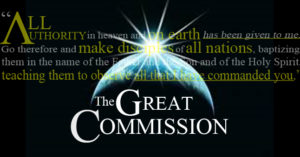 A few moments ago, as is my custom, I finished spending the first few minutes of the day praying, reading the Bible, and meditating. I have been a Christian since 1977, and for the vast amount of that time, this has been my daily routine. This has been true as a layperson, as a pastor, and as a parent. After all these years, I do not feel right on the days I skip and hope and believe it makes a difference in who I am and how I behave.
A few moments ago, as is my custom, I finished spending the first few minutes of the day praying, reading the Bible, and meditating. I have been a Christian since 1977, and for the vast amount of that time, this has been my daily routine. This has been true as a layperson, as a pastor, and as a parent. After all these years, I do not feel right on the days I skip and hope and believe it makes a difference in who I am and how I behave.
A committed disciple is committed to spend time in the written Word of God and so as to have the knowledge base to grow in likeness and fellowship with the Word Made Flesh. To be a disciple is to be centered in Holy Scripture in and on the One of whom Scripture speaks. A great deal of what we can know about God, Christ, the Holy Spirit, and the Christian life we learn by listening to the voice of God in Scripture. This knowing about, however, is of no use to us unless it results in our growing in a relationship with God in Christ and in our personal likeness to Christ.
In Acts, Paul leaves Thessalonica for Berea. Initially, the Thessalonians were resistant to the Good News and did not want to hear Paul’s message. Later in Berea, things were different. Luke records: “Now the Bereans were of more noble character than the Thessalonians, for they received the message with great eagerness and examined the Scriptures every day to see if what Paul said was true. Many of the Jews believed, as did also a number of prominent Greek women and many Greek men” (Acts 17:11-12). Those who earnestly hear the gospel of Christ are almost always eager to study their Scriptures. We study our scripture to test the testimony and opinions of others and to grow in our understanding of God, God’s world, our fallenness, and our unique place in God’s plan to redeem the world.
 In perhaps his last letter, Paul underscores the importance of Scripture as he writes young Timothy:
In perhaps his last letter, Paul underscores the importance of Scripture as he writes young Timothy:
But as for you, continue in what you have learned and have become convinced of, because you know those from whom you learned it, and how from infancy you have known the holy Scriptures, which are able to make you wise for salvation through faith in Christ Jesus. All Scripture is God-breathed and is useful for teaching, rebuking, correcting and training in righteousness, so that the man of God may be thoroughly equipped for every good work (2 Timothy 3:14-17).
Here we see Scripture liftedup for what it is: the source of Godly wisdom, of a deeper understanding of the secret wisdom revealed in Christ, of the nature of faith, and of our hope in God through Christ. The Scripture was given to us by the Spirit of God and teaches us, rebukes our sin, corrects our errors, and trains us in the ways of God.
The Crisis of Biblical Knowledge
For a long time, pastors, scholars, and students have known that “Biblical literacy” is declining in our culture. There was a time when the Bible was found in almost every home in Europe and North America. There was a time before radio, television, and other forms of media and reading the Bible in family groups was common. There was a time when public schools and colleges taught the Bible and taught literature based upon the Bible. In such a culture, most people grew up with some understanding of the story the Bible is telling in the culture was formed by the story of the Bible.
 This is no longer true, the story that the Bible tells us no longer at the center of our civilization. When Dietrich Bonhoeffer wrote the cost of discipleship, Europe was no longer filled with Christian nations. The elites that ran European countries no longer believed in historic Christian faith; however, the educated and were part of the culture in which their fundamental values were formed by the Christian story. Unfortunately, this is no longer true in Europe or in the United States.
This is no longer true, the story that the Bible tells us no longer at the center of our civilization. When Dietrich Bonhoeffer wrote the cost of discipleship, Europe was no longer filled with Christian nations. The elites that ran European countries no longer believed in historic Christian faith; however, the educated and were part of the culture in which their fundamental values were formed by the Christian story. Unfortunately, this is no longer true in Europe or in the United States.
Instead, in Europe and the United States, as well as the other parts of the world formed by European in the American culture, political, educational, cultural, and artistic leaders performed by a worldview that excludes God, the miraculous, the notion of a personal communication from God, prayer, and other facets of Christian faith. People formed by such a worldview simply do not find Christian faith, values, or morals important or realistic.
The situation will not change, and the crisis of discipleship will continue, until a group of people become deeply formed by the Christian story and Christian faith so that their approach to life and to secular problems of life are formed by the Christian story. The formation and growth of such a group of people cannot be done by mass media, but corporate education, or by large, entertainment driven, local congregations. [1] It can only be done within small groups of people who are studying the Scriptures, praying and leaving out the Christian life together.
In Romans 12, Paul talks about our need to see the world the way God sees the world when he says:
I urge you, brothers and sisters, in view of God’s mercy, to offer your bodies as a living sacrifice, holy and pleasing to God—this is your true and proper worship. Do not conform to the pattern of this world, but be transformed by the renewing of your mind. Then you will be able to test and approve what God’s will is—his good, pleasing and perfect will (Romans 12:1-2).
Paul, like Jesus, thinks that our faith should make a difference in how we behave. He teaches us that, if we see the world the way God sees the world, being transformed in the way we view the world, then we will offer God our lives and automatically do the kinds of things that please God. This transformation will not and cannot occur until and unless we change the way we see the world, think about the world, and respond to the challenges of everyday life.
 The Bible is a tool we use in day-to-day life. [2] all tools require skill to use properly. Generally, the utility of a tool is only fully available to a craftsman trained and experienced in the proper use of the tool so that its use is second nature. Mental tools are no different. The value of wisdom literature is not in the study of it, or even in the memorization of its teachings, but in internalizing and consciously and unconsciously learning to live wisely over an extended period of time.
The Bible is a tool we use in day-to-day life. [2] all tools require skill to use properly. Generally, the utility of a tool is only fully available to a craftsman trained and experienced in the proper use of the tool so that its use is second nature. Mental tools are no different. The value of wisdom literature is not in the study of it, or even in the memorization of its teachings, but in internalizing and consciously and unconsciously learning to live wisely over an extended period of time.
An example of this function of wisdom is the warnings of wisdom literature against laziness and against excessive work (compare, Proverbs 12:4 with Proverbs 23:4). These proverbs provide a way of thinking about work and leisure. They are not a substitute for personal decision. They are an aid to thinking and acting, not a substitute for personal responsibility. This book intends to encouragement readers to rediscover wisdom literature not as the solution to the problems of life but as a source of basic principles that we can apply to live wisely.
As we study, memorize, and meditate on the Bible and the story of God and humanity that it tells, we learn to “indwell” the story and its principles. Only when the stories and teachings of the Bible are internalized, so they are tacitly available to us as part of our conscious and unconscious perception of the world, can they perform their most important use in guiding thought and action. [3] This is why wisdom literature is important for young people to internalize at an early age so that it can function to guide their perception and experience over the long course of their lives.
Modern Christian churches (including my own) have not done a sufficient job of providing members and children with the skills in living wisely required to meet the challenges of our society and the prevailing culture. This book is designed to help Christians understand and respond to the challenges our culture presents to the wise life. I have attempted to connect wisdom literature with the greater narrative of Scripture to show how Old Testament wisdom fits into the greater story of God’s wisdom and redeeming love.
The crisis of our civilization and world is largely due to a lack of understanding of the true story of the world and the love affair that god desires to have with all people, of every tribe and nation. The Good News of this story is contained in the Bible and particularly in the stories of the life death and resurrection of Jesus, of his interaction with people, and of the response of those people to the Good News.
Transformed by the Word
As Christians study Scripture and meditate upon the One revealed in its pages, we encounter the God revealed to us in the life, death and resurrection of the Lord Jesus Christ. As Paul says in Romans, “faith comes from hearing the message, and the message is heard through the word of Christ” (Romans 10:17). Later, in Colossians, Paul urges Christians to, “Let the word of Christ dwell in you richly as you teach and admonish one another with all wisdom, and as you sing psalms, hymns and spiritual songs with gratitude in your hearts to God” (Col. 3:16). As we listen to others in a Bible Study or Sunday School Class, God’s word, the Word of Christ, enters our hearts through the window of our minds. Slowly, but surely, we are transformed.
[1] I hesitated to use the phrase, “large entertainment driven churches,” for fear that the phrase would be taken pejoratively. Recent years have seen the emergence of large congregations that rely upon sophisticated media and popular music in worship. There is nothing wrong with this approach. However, as powerful as the worship experience may be in these congregations, discipleship formation cannot be done in worship alone. Many of these congregations recognize this fact and are deeply committed to developing discipling ministries in their congregation.
[2] This part of this chapter is adapted from and based upon a similar section in my earlier book, Path of Life: The Way of Wisdom for Christ Followers (Eugene, OR: Wipf & Stock, 2014), 10-11.
[3] Michael Polanyi, The Tacit Dimension (Glouchester, MA: Peter Smith, 1983). The work of Polanyi and its application to wisdom thinking is often noted during the course of this study.














































